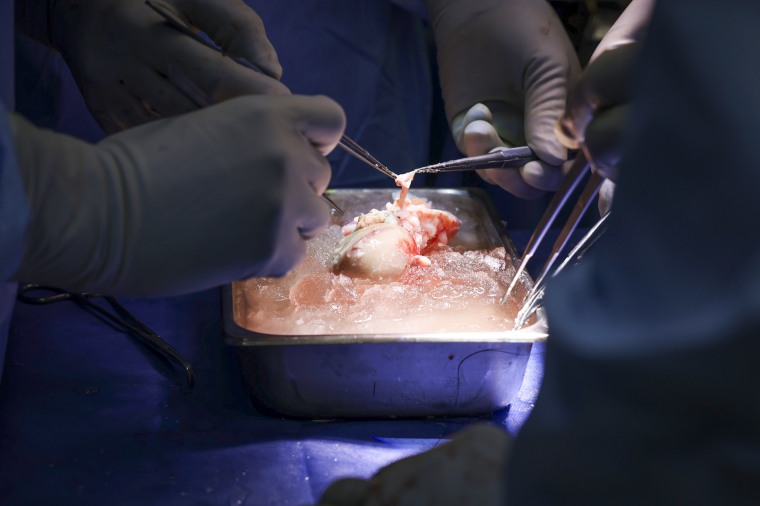“His blood pressure, his vital signs are very stable,” he said. “He looks almost completely on the way to full recovery.”
Still, doctors are collecting samples of Slayman’s blood around the clock, looking for signs of a dangerous virus, which is believed to have killed the man who received the first genetically modified heart from a pig in 2022.
The question of how long the kidney will last remains.
“It will be really interesting to learn whether or not the xenograft is ultimately a bridge, meaning it lasts for a short period of time until a human allograft can be found, or if it’s going to be what we call destination, meaning it will last this individual the rest of his life,” said Dr. Jayme Locke, a transplant surgeon at the University of Alabama Birmingham Heersink School of Medicine.
Even so, “it’s game-changing,” Locke said.
A one-off, for now
Xenotransplantation isn’t approved by the Food and Drug Administration. Though it’s been touted as a potential solution to the worldwide organ shortage, it could be years before the procedure is widely used, as much more data is needed.
“What we really want to do is get to the initial clinical trials, where you have multiple patients that are receiving xenografts and several centers that are participating where you can really test a hypothesis and see how safe this is and how well it works,” said Dr. Robert Montgomery, the director of the NYU Langone Transplant Institute.

Slayman’s transplant was performed under the FDA’s compassionate use program, which lets patients with serious, life-threatening conditions access experimental treatments when nothing else is available.
“It’s a one-off transplant,” said Karen Maschke, a researcher at the Hastings Center, a bioethics research institute, who studies the ethical, regulatory and policy issues involving the use of new biomedical technologies.
While Slayman was unique in that he was chosen for a pig kidney transplant, his condition was far from rare: About 800,000 people in the U.S. have kidney failure and require dialysis, often a time-consuming process for patients.
Slayman had previously received a kidney transplant from a deceased human donor in 2018 after having been on dialysis for seven years. The transplant, however, showed signs of failure last year, and he resumed dialysis.
Williams said putting Slayman back on the waiting list for a new kidney was an option, although that would have entailed a wait of six to seven years, a time frame Williams doubted Slayman would have survived.
“He was in dire straits,” Williams said.
So Dr. Leonardo Riella, the medical director of kidney transplantation at Mass General, proposed another option: a pig kidney transplant, which, Williams said, Slayman agreed to, adding that he was frustrated with dialysis.
“Our hope is that dialysis will become obsolete,” Riella said at a press conference Thursday.






